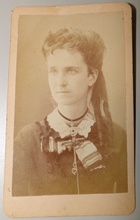Laws schools have been around since 1784, but it wasn’t until 1869 that the first female lawyer was admitted to practice law in the United States.
Arabella Mansfield was born in Des Moines County, on a farm, and married to young professor at Iowa Wesleyan who encouraged her ambition to study law. While she originally taught at Des Moines Conference Seminary, now known as Simpson College in Indianola, Iowa, she found herself reading the law in her brother’s office for almost two years after he passed the bar and established his practice.
In 1869, Mansfield choose to take the bar exam even though it was restricted to males over 21 by law in Iowa. The exam at that time was taking orally and Mansfield impressed the board with her ability and knowledge. She took her summary to court and challenged the state law that excluded her. The court ended up ruling that women may not be denied the right to practice law in Iowa. Although she didn’t attend law school, Mansfield was admitted to the bar, allowing her to be sworn in as the first female lawyer in the U.S. later that year.

Iowa legislature officially changed state law on licensing lawyers (Iowa Code 1860, Chapter 114, section 2700) in 1870, dropping the requirement of being a white male and three years later, Mary Beth Hickey became Iowa Law’s first woman graduate.
In 1875, the College of Law had its next two female graduates, Mary Humphrey Haddock, who proceeded to be the first woman admitted to practice before the District and Circuit Courts of the United States and Annie Nowlin Savery, who served as a pioneer feminist and activist for women’s suffrage.
Over the next few years more women continued to graduate from Iowa Law and in 1891 Jennie L. Wilson was hired as the first full-time librarian at the Law Library right after graduating. She served until 1893 and authored two books about the legal rights of women with Legal Status of Women in Iowa being published in 1894.
Beulah Wheeler was also another important woman in Iowa Law’s history, being the first African American woman to graduate from the law school in 1924. In May 1921 she won second prize in a short story contest held by the University for “Soapsud Dreams,” described as a “study in realism,” as well as the Women’s Extemporaneous Speech Contest with her speech, “Uniform Marriage and Divorce Law.” After school, she moved to Leavenworth, Kansas, for three years and then to Chicago, where she practiced law.
In 1973, Josephine Gittler became the first female faculty member at Iowa Law, paving the way for the now 42.5% female faculty rate. She is still teaching here today.
